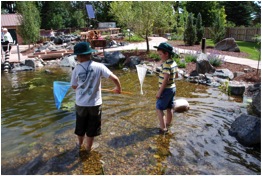Addressing Environmental Literacy in Wyoming
The U.S. public is facing an environmental literacy gap that appears to be increasing rather than decreasing. For example, a survey preformed by The National Environmental Education Foundation found that 45 million Americans think the ocean is a source of fresh water and 130 million believe that hydropower is America’s top energy source (The National Report Card on Environmental Attitudes Knowledge and Behavior). Some people, like Dr. Annie Bergman from the Wyoming Association for Environmental Education, are trying to reverse that trend. Dr. Bergman is spearheading an effort to create a statewide Environmental Literacy Plan for Wyoming that will address Wyoming’s unique natural heritage. As a first step, she is holding eleven different Environmental Literacy Plan (ELP) focus groups around the state. And this week NOLS facilitated a session in Lander.

According to noted professor David Orr, an environmentally literate citizen is one who has “an intimate knowledge of our landscapes, and an affinity for the living world.” Environmental Literacy is an understanding of science, economics, and culture as related to the environment and natural resource use. This understanding fosters critical thinking skills, and the connection to nature that inspires stewardship and informed action.
The goal of the Lander session was to gather input from interested stakeholders to create an ELP for Wyoming that will address Wyoming’s unique natural heritage. The ELP is intended to be implemented by the State Department of Education with assistance from nonprofits and agencies.
The plan will address three areas for strengthening environmental education in public schools:
1. Identify the content knowledge and critical thinking skills necessary for understanding and making decisions that relate to the environment. Connect these to the current state education standards.
2. Address the means by which the knowledge and skills can be developed in students, including outdoor education, place-based education, and service learning.
3. Create opportunities for teachers to increase their own knowledge and skills to meet the standards set forth in Excellence in Environmental Education—Guidelines for Learning (K-12).
 According to participants in the Lander focus group, there is little communication among different agencies and organizations on the Environmental Literacy front. This has resulted in duplication of effort in some areas, and no programs in others. WEEA hopes that this project will provide a vehicle for communication and encourage collaboration. Ideally, this ELP will provide a vision as to how programs like NOLS can support others to achieve the vision of environmentally literate citizens in Wyoming.
According to participants in the Lander focus group, there is little communication among different agencies and organizations on the Environmental Literacy front. This has resulted in duplication of effort in some areas, and no programs in others. WEEA hopes that this project will provide a vehicle for communication and encourage collaboration. Ideally, this ELP will provide a vision as to how programs like NOLS can support others to achieve the vision of environmentally literate citizens in Wyoming.
Photos courtsy of Annie Burgman
Topics:
